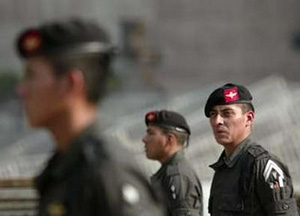 |
 |
 |
 Editorials | Issues | December 2006 Editorials | Issues | December 2006  
Calderon to Take Harder Line on Mexican Opposition
 Patrick Harrington & Thomas Black - Bloomberg Patrick Harrington & Thomas Black - Bloomberg


| | Members of the Army's parachutes division stand guard outside the National Auditorium a day before the inauguration of Felipe Calderon as President, in Mexico City November 30, 2006. (Reuters/Tomas Bravo) |
Mexico's president, Felipe Calderon, has signaled he'll take a tougher stance than his predecessor against dissident groups and parties that threaten to undermine his authority after he takes office today.

The first challenge comes this morning as opposition lawmakers, in a bid to block Calderon from taking the oath before Congress, punched and shoved Calderon supporters. Calderon, who this week named as interior minister a former governor known for his crackdown on anti-globalization protesters during former President Vicente Fox's administration, said he will get to the podium -- no matter what.

``Calderon can't give in to pressure like Fox did or he'll send signals of weakness that he can't afford,'' said Jose Antonio Crespo, a political analyst at the Center for Economic Research and Teaching in Mexico City. ``If he adopts a very hard, rigid line, he could lose control of the country.''

Calderon, 44, is inheriting ``social and political landmines'' from Fox, who was loathe to use force to quell unrest, said George Grayson, a professor of government at the College of William and Mary in Williamsburg, Virginia. Failure to address the problems quickly would indicate Calderon won't follow through on his campaign pledge to enforce the rule of law and could erode investor confidence, Crespo said.

Calderon took over as president from Fox in a private ceremony just past midnight at the presidential residence in Mexico City, known as Los Pinos.

He still faces a challenge from losing presidential candidate Andres Manuel Lopez Obrador, who led a 47-day blockade of downtown Mexico City following the July 2 election. Lopez Obrador, a former Mexico City mayor, has declared himself the ``legitimate'' president and continues to call his followers to the streets.

In Oaxaca City, rock-throwing protesters clashed with police on Nov. 26, burning cars and government buildings almost a month after Fox sent 4,500 unarmed federal police officers to end dissidents' six-month occupation of the city's center.

Turf wars between drug gangs in at least five states also has spawned violence that spurred U.S. Ambassador to Mexico Antonio Garza to complain about ``near-lawlessness'' in the northern border region.

Slipping Authority

Crespo said the slide in authority under Fox began when machete-wielding farmers in August 2002 refused to give up land expropriated for a new airport in Texcoco, a dried-up lakebed about 12 miles northeast of Mexico City. The government canceled the $3 billion project.

On Sept. 1, Fox retreated from delivering his final state of the nation speech in Congress when opposition lawmakers blocked the rostrum. Two weeks later, he skipped a traditional Independence Day ceremony in downtown Mexico City because of protests by Lopez Obrador's supporters.

``It's as tough a time as there has been to become a new Mexican president,'' said George Grayson, a professor of government at the College of William and Mary in Williamsburg, Virginia.

Campaign Promise

Calderon's response to the unrest and disorder will be different than Fox's, said Luis Garcia, chief executive officer of Investra Consultores, a Monterrey-based investment firm that manages about $300 million in fixed income and equities. Calderon made law enforcement and cracking down on crime a priority during his campaign, offering such concrete proposals as forming one federal police force to combat crimes, such as drug trafficking and kidnapping.

Still, the use of force could backfire in a nation that spent seven decades under one-party rule and where courts are still seeking to prosecute former officials accused of massacres and kidnapping. This week, a judge ordered the arrest of former President Luis Echeverria in the gunning down of protesters in Mexico City's Tlatelolco square in October 1968.

`Very Desperate Quandry'

Calderon will have to strike a balance between order and repression, said James Wilkie, a history professor who chairs a Mexico program at the University of California at Los Angeles.

``Calderon and his administration are in a very desperate quandary,'' Wilkie said. ``It looks bad if the police can't even control basic situations, but nobody wants to be accused of human-rights violations.''

The new president needs to make a dramatic gesture at the start of his administration to show he won't tolerate lawbreakers or corruption, Garcia said. Calderon, for example, could jail the governor of Oaxaca, who has been accused by opposition leaders of embezzling federal funds, he said.

``It's fundamental that Felipe pounds the table hard to legitimize his presidency,'' Garcia said. ``This is what we need to see.''

Investors are betting Calderon has the political skill to keep opposition groups at bay and cobble together support in Congress, where his National Action Party, the largest bloc, still lacks a majority.

Market Reaction

Markets didn't react to political tensions that bubbled over on Nov. 28 when legislators from Calderon's and Lopez Obrador's parties came to blows as they tried to control the congressional dais where Calderon is scheduled to be sworn in today.

The benchmark Bolsa stock index closed yesterday at a record high of 24,962.01 and has gained 40 percent on the year. Mexico's seven-year, 9 percent peso bonds were sold to yield 7.78 percent, a three-year low, at a weekly debt auction on Nov. 28.

``There's some built-in benefit of doubt,'' said Gray Newman, an economist with Morgan Stanley in New York. ``That's what the market is reflecting right now.''

To contact the reporter on this story: Patrick Harrington in Mexico City at pharrington8@bloomberg.net or Thomas Black in Monterrey at tblack@bloomberg.net | 
 | |
 |



